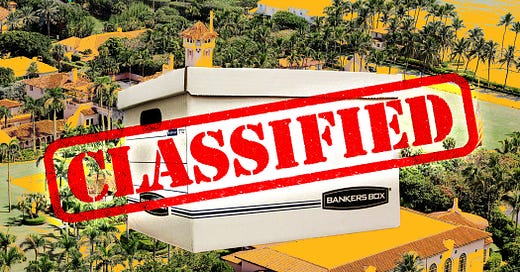
Trump, Indicted for Mishandling Classified Documents, Asks Judge for More Classified Documents
Special Counsel Jack Smith wants Trump-friendly Judge Aileen Cannon to reject the request.
ON MONDAY, U.S. DISTRICT JUDGE AILEEN CANNON held a closed-door hearing in the classified documents case pending in Florida against Donald J. Trump and two co-defendants, Waltine Nauta and Carlos De Oliveira. Trump—who appointed Cannon to the bench—showed up for the hearing, which was held in a SCIF (a Sensitive Compartmented Information Facility) for the security of the classified subjects under discussion.
This is the same Donald J. Trump who stole the classified documents in the first place.
Nauta and De Oliveira were left out of the proceedings because they lack security clearances. Special Counsel Jack Smith didn’t attend Trump’s hearing, either, which was specifically designed to enable Trump to present his “defense theories of the case” and to explain how “any classified information might be relevant or helpful to the defense.” Smith got his turn to present the government’s position at a separate hearing on Monday, for which Cannon allotted two hours. Trump’s team got four and a half.
Nope, you can’t make this up.
Given all the chatter around Trump’s January 6th liability—including the Supreme Court’s oral argument last Thursday regarding Section 3 of the Fourteenth Amendment and an appeals court’s rejection of Trump’s claim of absolute presidential immunity in the federal criminal case pending in Washington, D.C.—it’s easy to forget that the Mar-a-Lago case is continuing, and that he faces forty charges in federal court in Florida. Those charges include felony obstruction, lying to law enforcement, withholding and concealing dozens of classified government records, and willful retention of national defense information in violation of the federal Espionage Act. According to the July 2023 superseding indictment, Trump also demanded that De Oliveira, a Mar-a-Lago property manager, delete security footage at the Florida estate following a visit in June 2022 by federal investigators seeking to get back the classified information he took from the White House. Nauta is charged with moving boxes around at Trump’s direction and lying about it. Everyone has pleaded not guilty.
Monday’s hearings concern a statute called the Classified Information Procedures Act, or “CIPA,” which dictates a process for determining how classified materials should be handled in federal criminal cases that implicate classified information. Congress enacted CIPA out of an understandable concern that unauthorized disclosure of classified information during court cases could compromise national security. In cases like this one, which involve highly classified information that’s needed to prove the government’s case beyond a reasonable doubt, the Justice Department must make difficult decisions regarding the national security “cost” of going forward with criminal prosecutions. The alternative is to allow criminal defendants to go free out of fear that taking them to trial would damage the broader interests of the United States. Here, Smith accepted the possible risk of disclosure in order to hold Trump accountable.
It’s now Cannon’s job to take sufficient steps to protect the United States against the dangers Trump poses by possessing—for purposes of the prosecution—the very classified information that he’s charged with unlawfully stealing.
CIPA requires Cannon to do a few things, including:
to issue an order “to protect against the disclosure of any classified information disclosed by the United States to any defendant in any criminal case”;
to “authorize the United States to delete specified items of classified information from documents to be made available to the defendant through discovery”; and
to hold a hearing at which the defendant can advise the court of what classified information he intends to disclose, and allow the government to substitute redacted versions or summaries instead.
Translation: Cannon is supposed to allow the government to give Trump and the jury redacted versions of classified information and also to make sure that Trump doesn’t disclose the stuff he does get.
What has Cannon done so far pursuant to her CIPA obligations?
Well, in June 2023, she did issue an order protecting classified information from disclosure. But last week, she issued another order granting the defendants’ motion to unseal their motions to compel discovery from the government. The motions to compel had attached to them sensitive information. Pursuant to Cannon’s earlier order, the motions were filed on the public record in a redacted form—meaning classified information was blacked out. Trump and company (along with members of the press) asked Cannon to unseal their motions and make their contents fully public. Last week, she partially granted that request over Smith’s objection—even though it meant revealing the identities of government witnesses.
On Thursday, Smith responded with a motion asking Cannon to reconsider her order (along with another, related one), arguing that her rulings:
would disclose the identities of numerous potential witnesses, along with the substance of the statements they made to the FBI or the grand jury, exposing them to significant and immediate risks of threats, intimidation, and harassment, as has already happened to witnesses, law enforcement agents, judicial officers, and Department of Justice employees whose identities have been disclosed in cases in which defendant Trump is involved.
We all know precisely what Smith is referring to here: In the civil fraud case brought by New York Attorney General Letitia James in state court in Manhattan, Judge Arthur Engoron has issued numerous gag orders and slapped Trump with monetary sanctions, stating: “Since the commencement of this bench trial, my chambers have been inundated with hundreds of harassing and threatening phone calls, voicemails, emails, letters and packages.” In the January 6th criminal case against Trump in Washington, D.C., U.S. District Judge Tanya Chutkan similarly issued an order banning him from publicly targeting court personnel, potential witnesses, and Special Counsel Smith and his staff. (That order has been paused by the appeals court as Trump’s immunity claim remains unsettled.)
This is the same Donald Trump who publicly targeted two black election workers in Georgia, prompting a slew of threats and racist abuse against them. In December, a federal jury in Washington, D.C., ordered Rudy Giuliani to pay nearly $150 million in damages for defamation against the mother and daughter, who testified at trial about how Giuliani’s (and Trump’s) lies had destroyed their job opportunities, communities, and personal identities.
IN THE MAR-A-LAGO CASE, Trump is arguing for broad access to classified documents, four categories of which the government has deemed “especially sensitive” and concerning “multiple federal agencies.” He is also expected to file a copycat motion to dismiss the case on the same bogus immunity grounds that he lost in the D.C. Circuit, which could further delay the proceedings. Cannon has set March 1 for a hearing on the remaining deadlines in the case.
The one shred of good news is that whatever Cannon does under CIPA is immediately appealable to the U.S. Court of Appeals for the Eleventh Circuit. This is the same Eleventh Circuit that roundly rejected Cannon’s ridiculous and embarrassing sideshow of appointing a special master to second-guess the FBI at Trump’s request back in August 2022. Although May 20 is the current trial date, speculation remains that she is slow-walking the trial unnecessarily, aware the delay is Trump’s best friend in all of the criminal cases against him, as he has very little by way of law and facts to argue in his defense. Pressure is on Smith to seek an order recusing her from the case. The outcome of Monday’s hearings could push him in that direction.

















